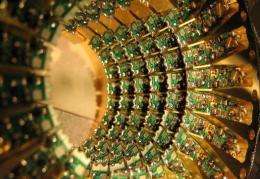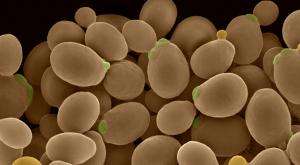February 5, 2010 weblog
Google Has More Than Android On Its Platform

(PhysOrg.com) -- In the last several weeks, we've read a bit about how Google is getting restless just being the world’s largest search engine and a proud cloud computing parent. In fact, Googleland is growing by quantum leaps and bounds.
Behind the scenes, in fact, Google has been working with a D-Wave quantum computer that seems to be able to spot images of cars from among 20,000 photos faster than any other Google computer. Though there are reports of skepticism among higher math experts that D-Wave really is a quantum computer, it’s clear that Google is going to be the first to use the quantumest computer available to its fullest capacity.
Fast and accurate sorting capability is a must, and not just for Internet browsers. Think about the jobs of radiologists, for example, looking for a diseased cell or two in a mass of tissue. Or a baggage screener looking for a gun, a knife, or a bomb in someone’s carry-on bag. Recently published research on “visual attention," prepared by Harvard professor Jeremy Wolfe, demonstrates that the more we [humans!] look for that “needle in a haystack,” the less likely it is that we will find it. Now, how does that make you feel when you take a mammogram or get on an airplane?
But what if a quantum computer could detect the diseased cell? And not only that. What if that super computer could determine which antibody might kill that cell without harming the surrounding cells? Think about how much time that would save researchers in testing various drugs, and how much time it would save in getting approval for potential life-saving drugs.
It’s highly likely that Google Venture’s recent investment into Adimab was made with a computer antibody identifier in mind. Adimab, a New Hampshire-based biotech company, has already developed a simulated human immune system, composed of engineered yeast cells, that produces antibodies in response to drug molecules. This process obviates the need for testing engineered mice, as well as other animal testing, and produces therapeutic outcomes in less than eight weeks.

Already having a leg up on other biotech firms with its proprietary technology, Adimab has attracted investments from Polaris Venture Partners, SV Life Sciences, OrbiMed Advisors, and Borealis Ventures. But Adimab COO Errik Anderson admitted that Google's investment was not just financial. In an interview with Xconomy, Anderson said that “...it was clear that Google Ventures immediately understood our value proposition—that a prolific discovery platform can drive even greater productivity when integrated with advanced computational tools.”
Some interesting times ahead for supercomputing and for Google; that’s for sure.
More information:
-- Adimab www.adimab.com/index.html
-- Google Collaborates with D-Wave on Possible Quantum Image Search www.physorg.com/news180107947.html
-- Google demonstrates quantum computer image search www.newscientist.com/article/d … er-image-search.html
-- Google Pours “Incredible” Computing Power into Antibody Drug Discovery With Adimab www.xconomy.com/boston/2010/02 … ab/?single_page=true
-- Guns, Tumors And The Limits Of The Human Eye www.npr.org/templates/story/st … hp?storyId=122561355
© 2010 PhysOrg.com




















